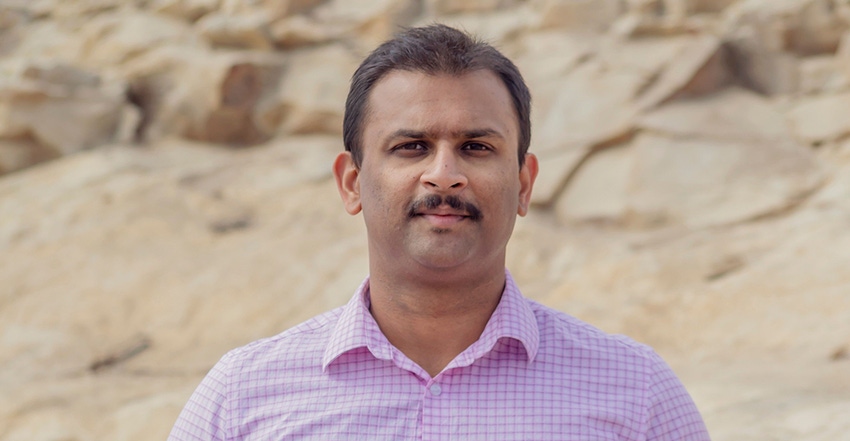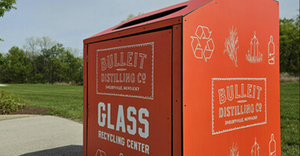Avid Hiker Uses Alexa Technology to Help Meet Zero Waste Needs
Nik Balachandran’s Zabble leverages existing platforms to empower waste industry professionals and voice assistants to educate people.

As an avid hiker and open water swimmer in the San Francisco Bay area, Nik Balachandran started taking notice of the excessive amounts of waste in the environment.
"Over the last couple years, I’ve swum through some plastic trash in the Bay and picked it up on local trails,” he says. “Seeing all the waste ending up in the landfill and the ocean kept me up all night. I wanted to leverage my experience and today’s innovative technology to help people and businesses reduce waste, save money and protect Earth.”
Compelled by his observations, Balachandran quit his day job to dive into the waste industry in 2016. He founded Zabble, which was incorporated in July 2016, but really started working with small businesses in San Francisco in mid-2017.
Located in Walnut Creek, Calif., Zabble's mission is to build a digitization platform to quantify and categorize generation and disposal of materials so businesses, municipalities and people can make informed decisions to reduce waste, save money and protect Earth.
Now CEO, Balachandran says the name Zabble originated from the Arabic word Zabbaleen, which in Egypt refers to garbage pickers who collect, sort and create upcycled goods from garbage. The company is revamping its website and getting ready to launch new products.
Waste360 recently sat down with Balachandran to discuss Zabble and his belief that in order to control and prevent waste from entering the environment, it needs to be measured like electricity, water and gas.
Waste360: How does Zabble work?
Nikhil Balachandran: Zabble created a cloud-based enterprise mobile platform for waste audits called Log Zero and an Amazon Alexa-based app called Waste Guru, which uses machine learning algorithms to respond to questions like, “Hey, Alexa, ask Waste Guru, where do I throw a pizza box?” with a municipality-specific answer. It is available for free on any Alexa-powered device.
Waste360: How is your smart monitoring technology helping companies reach their zero waste goals?
Nikhil Balachandran: Zabble’s digitization journey began with an internet-connected scale to speed up waste audit data collection and reporting. Now, that has evolved into a customizable enterprise platform, Log Zero, which makes it easy to conduct waste characterization and visual audits. Log Zero provides a snapshot of the waste stream operations with key operational metrics like diversion, contamination and greenhouse gas emissions. This, along with actionable insights within seconds, enables field personnel, recycling coordinators, waste audit and sustainability managers to optimize service levels and operations.
Waste360: What is the technology behind it?
Nikhil Balachandran: Our deep knowledge in data science from experience at numerous cutting-edge, sensor-related startups in the Bay Area has led us to create a powerful analytics engine that is able to integrate disparate data sources and turn them into actionable insights in real time. We realized the high costs and maintenance associated with sensor-related technology. So, we decided to focus on leveraging existing platforms like mobile devices to empower waste industry professionals and voice assistants like Amazon Alexa to educate people.
Waste360: How does it track waste, streamline processes and save money?
Nikhil Balachandran: Currently, field audits are conducted on paper logs that are the antithesis of zero waste and the digital economy. The data is then re-entered on spreadsheets after errors are corrected and analyzed on a static spreadsheet. It’s a time-consuming and laborious process to get to the insights while managing multiple spreadsheets.
Through Log Zero, our cloud-based mobile platform, we created a paperless system to track, schedule, conduct, analyze and report visual audits and waste characterization studies. It provides standardization and transparency by connecting back office, field personnel and supervisors. Full visibility into the waste operations can give enterprises and municipalities a better understanding of targeting their outreach efforts to reduce waste, increase diversion and reduce contamination. This directly leads to avoiding fines by staying complaint with local regulations, right-sizing service levels and reducing operational costs.
Waste360: How is your technology impacting the waste and recycling industry?
Nikhil Balachandran: These are turbulent times for the waste and recycling industry with China’s import ban, sky-high contamination levels and the constant changing of material composition. Digital transformation is vital for businesses and municipalities to understand and adapt to the changing nature of the waste stream. Our technology helps jumpstart this new era by using an enterprise cloud-mobile platform built for the industry and municipalities just like what CRM [customer relationship management] and ERP [enterprise resource planning] did for optimizing sales and business processes.
Waste360: What types of businesses do you currently work with?
Nikhil Balachandran: We are currently in the POC [proof of concept] stage with numerous enterprises and are commercially launching soon with testimonials and case studies. Our technology is very customizable to each client’s needs, whether it’s waste and property management companies, municipalities or environmental consulting firms that have a need to digitize and streamline their operations for efficiency and cost reduction.
About the Author(s)
You May Also Like


